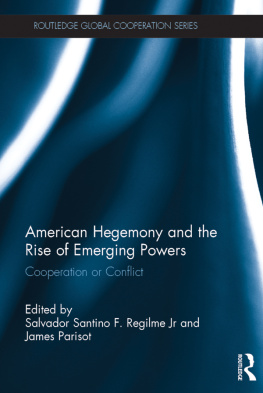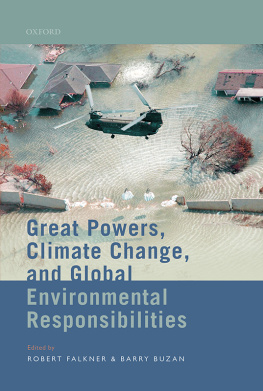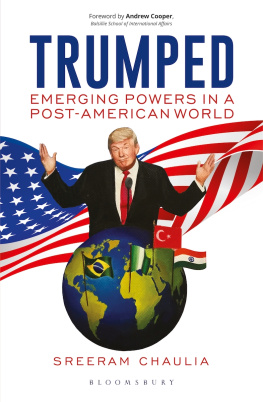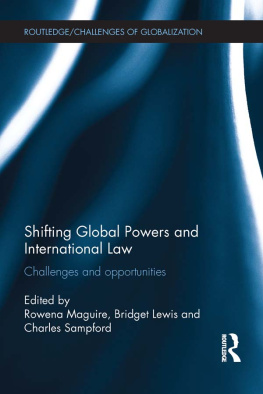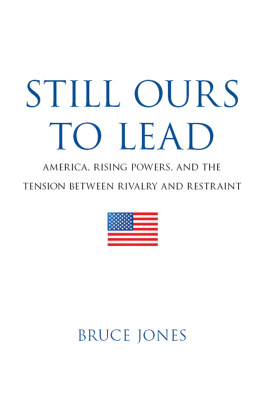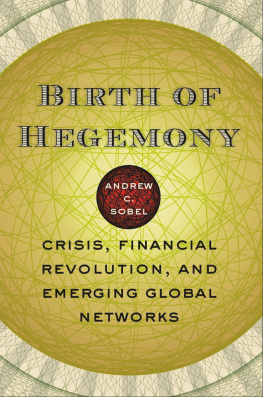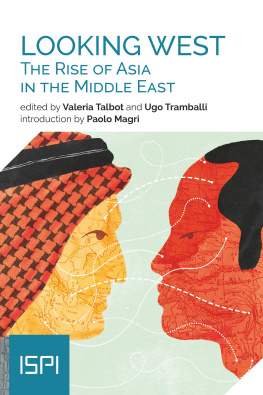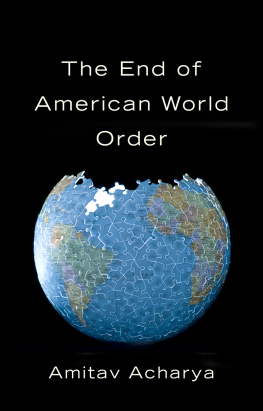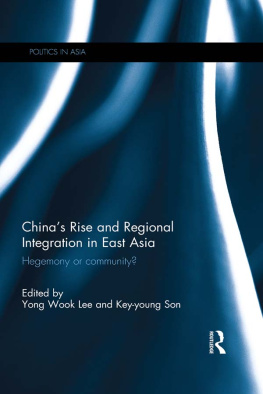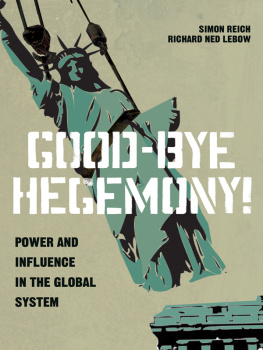p.i
American Hegemony and the Rise of Emerging Powers
Over the last decade, the United States position as the worlds most powerful state has appeared increasingly unstable. The US invasions of Afghanistan and Iraq, non-traditional security threats, global economic instability, the apparent spread of authoritarianism and illiberal politics, together with the rise of emerging powers from the Global South have led many to predict the end of Western dominance on the global stage. This book brings together scholars from international relations, economics, history, sociology and area studies to debate the future of US leadership in the international system. The book analyses the past, present and future of US hegemony in key regions in the Asia-Pacific, Latin America, Middle East, Europe and Africa while also examining the dynamic interactions of US hegemony with other established, rising and re-emerging powers such as Russia, China, Japan, India, Turkey and South Africa.
American Hegemony and the Rise of Emerging Powers explores how changes in the patterns of cooperation and conflict among states, regional actors and transnational non-state actors have affected the rise of emerging global powers and the suggested decline of US leadership. Scholars, students and policy practitioners who are interested in the future of the US-led international system, the rise of emerging powers from the Global South and related global policy challenges will find this multidisciplinary volume an invaluable guide to the shifting position of American hegemony.
Salvador Santino F. Regilme Jr is an Assistant Professor of International Studies at the Institute for History at the University of Leiden, the Netherlands. He holds a joint PhD in Political Science and North American Studies from the Free University of Berlin, Germany, and he previously studied at Yale, Osnabrck, Gttingen, and De La Salle Manila.
James Parisot received his PhD in Sociology from Binghamton University, USA, and is part-time Faculty in the Department of Sociology at Temple University, USA. He has published articles in journals including, among others, Third World Quarterly , International Critical Thought and the Journal of Historical Sociology .
p.ii
Routledge Global Cooperation Series
This series develops innovative approaches to understanding, explaining and answering one of the most pressing questions of our time how can cooperation in a culturally diverse world of nine billion people succeed?
We are rapidly approaching our planets limits, with trends such as advancing climate change and the destruction of biological diversity jeopardising our natural life support systems. Accelerated globalisation processes lead to an ever growing interconnectedness of markets, states, societies, and individuals. Many of todays problems cannot be solved by nation states alone. Intensified cooperation at the local, national, international, and global level is needed to tackle current and looming global crises.
Series Editors:
Tobias Debiel, Claus Leggewie and Dirk Messner are Co-Directors of the Kte Hamburger Kolleg/Centre for Global Cooperation Research, University of Duisburg-Essen, Germany. Their research areas are, among others, Global Governance, Climate Change, Peacebuilding and Cultural Diversity of Global Citizenship. The three Co-Directors are, at the same time, based in their home institutions, which participate in the Centre, namely the German Development Institute/Deutsches Institut fr Entwicklungspolitik (DIE, Messner) in Bonn, the Institute for Development and Peace (INEF, Debiel) in Duisburg and the Institute for Advanced Study in the Humanities (KWI, Leggewie) in Essen.
https://www.routledge.com/Routledge-Global-Cooperation-Series/book-series/RGC
Titles:
Knowledge Production, Area Studies and Global Cooperation
Claudia Derichs
Democracy and Climate Change
Frederic Hanusch
World Politics in Translation
Power, Relationality, and Difference in Global Cooperation
Edited by Tobias Berger and Alejandro Esguerra
American Hegemony and the Rise of Emerging Powers
Cooperation or Conflict
Edited by Salvador Santino F. Regilme Jr and James Parisot
Integrating Sustainable Development in International Investment Law
Normative Incompatibility, System Integration and Governance Implications
Manjiao Chi
p.iii
This is a fascinating new analysis of the old question of American decline. Its one of those rare edited books that thrive on disagreement rather than building a consensus. The diverse perspectives here are sure to help inform debate about the changing world order. Amitav Acharya, Distinguished Professor of International Relations, American University, USA and former President of the International Studies Association
In their invigorating book, Regilme and Parisot send up a neon yellow warning flag: beware the analytical dangers of a seductive fixation on simplistic statist power hierarchies. That fixation, they reveal, will blind us to the more complex social processes that comprise current international politics. Cynthia Enloe, author of Bananas, Beaches and Bases and Research Professor of Political Science at Clark University, USA
Providing interdisciplinary perspectives on the past and potential future of American hegemony, this book is a timely analysis of a number of specific issue areas as they relate to emerging powers. Susan D. Hyde, Professor of Political Science and Avice Chair in Public Policy, The Charles and Louise Travers Department of Political Science, University of California, Berkeley, USA
This critical collection of voices profoundly deepens our understanding of one of the most fundamental questions of the 21st century. Will global power transformations lead to a more just and prosperous global order for all? Or will they ignite a conflict that will reverse decades of progress? Thomas Hale, Associate Professor of Global Governance, Blavatnik School of Government, University of Oxford, UK
This book deals with two of the most important features of the contemporary international system: the rise of new powers and the relative decline of the United States. The contributors provide an excellent and accessible analysis of these changes and their impact on key bilateral relations. Mark Beeson, Professor and Discipline Chair of Political Science and International Relations, University of Western Australia, Australia
Declining hegemony is the most debated subject in fields such as International Relations, World History, and Comparative Political Economy. American Hegemony and the Rise of Emerging Powers adds new and topical insights to this debate. The book shines through its interdisciplinary approach to the study of changes in global leadership, normative sovereignty, and international governance as they result from the rise and decline of epistemic, economic, financial, diplomatic, and military capabilities. Roland Czada, Professor and Chair in Government and Public Policy, University of Osnabrck, Germany
p.iv
Is US hegemony stable or declining? The answer, this eclectic collection suggests, depends on where one looks: economics, or security? East Asia, or Latin America? Central Asia, or Africa? The different regional perspectives in this book helpfully advance a debate on rising powers hitherto overly focused on China and global-level dynamics. Lee Jones, Reader in International Politics, Queen Mary, University of London, UK
This book confronts a question of profound importance. What will arise as US hegemony declines? The complexity of this question is addressed by a diverse group of insightful writers whose rich contributions establish the starting point for a discussion that is key to understanding the future direction of the international system. The stage has been set, let the debate begin. Jerry Harris, National Secretary, Global Studies Association of North America

